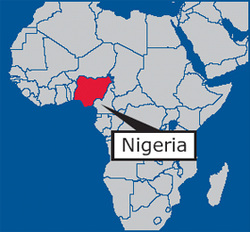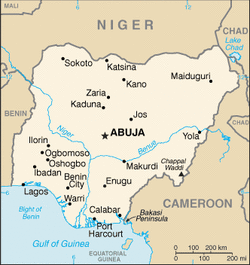Geography

Nigeria is located in West Africa
Nigeria is located in West Africa, bordered by Benin, Niger, Chad and Cameroon. It shares its southern coast with the Gulf of Guinea and the Atlantic Ocean. It is slightly larger than twice the size of California and has a tropical climate. Notable geographical landmarks include the Adamaua mountain range and the two large rivers: the Niger River and the Benue River. The delta of the Niger swamps at the Gulf of Guinea, in the south of the country.
lolol

Map of Nigeria.
Nigeria's main natural resources are natural gas, petroleum, tin, iron ore, coal, limestone, niobium, lead, zinc, and arable land.
Its main natural hazards are flooding and periodic droughts, but it also faces problems due to soil degradation, urban air and water pollution, desertification, loss of arable land, rapid urbanization, and oil pollution of water, air, and soil. Sources say as many as 546 million gallons of oil spilled into the Niger Delta over the last five decades, or nearly 11 million gallons a year. (NY Times, 2010)
People

Members of the major rebel group, known as the MEND rebels.
The population of Nigeria is approximately 152 million people. It is currently the eighth most populous country in the world and Africa's most populous country. It is said to be in stage 2 of the Demographic Transition model. The variety of customs, languages, and traditions among Nigeria's 389 ethnic groups gives the country a cultural diversity. The main religions are Muslim and Christian and the main languages spoken are: English, Hausa, Yoruba, Igbo (Ibo) and Fulani.
The majority of the population lives in extreme poverty, and consequently rebel groups are quite common. In particular, the Movement for the Emancipation of the Niger Delta (MEND), who capture foreign oil workers and demand Nigerians with ties elsewhere leave have been active in terrorizing the oil scene in Nigeria.
For a more in-depth look at the Demographics of Nigeria, click here.
Government

Flag of the Federal Republic of Nigeria.
The Federal Republic of Nigeria gained independence on 1 October 1960 (from the UK). It is a federal republic and the current president is Goodluck Ebele Jonathan. Jonathan assumed presidency on 5 May 2010 following the sudden death of President Yar'Adua.
Nigeria is ranked as one of the most corrupt countries in the world. (BBC World News, 2006) For decades the government has accrued huge oil revenues, yet the country suffers from a lack of basic infrastructure, and tens of millions live in poverty. But although the country has had corrupt leaders, the question now is if President Jonathan will be different and be able to tackle the problems of Nigeria. At present, he is dealing well with the rebels, something that is of extreme importance. However, his election has angered the northern Muslim political elite, who claim the presidency was meant to be for a northerner this term. And with former president Yar'Adua's death and another southern Christian in power, the Muslim population notes that "Jonathan is a frontline member of the Pentecostal church, which is the most vocal against Muslims." (Time Magazine, 2010) As well, there is concern of corruption, as Jonathan's wife was indicted by the anti-corruption Economic and Financial Crimes Commission for money laundering in 2007. (Time Magazine, 2010)
Nigeria is ranked as one of the most corrupt countries in the world. (BBC World News, 2006) For decades the government has accrued huge oil revenues, yet the country suffers from a lack of basic infrastructure, and tens of millions live in poverty. But although the country has had corrupt leaders, the question now is if President Jonathan will be different and be able to tackle the problems of Nigeria. At present, he is dealing well with the rebels, something that is of extreme importance. However, his election has angered the northern Muslim political elite, who claim the presidency was meant to be for a northerner this term. And with former president Yar'Adua's death and another southern Christian in power, the Muslim population notes that "Jonathan is a frontline member of the Pentecostal church, which is the most vocal against Muslims." (Time Magazine, 2010) As well, there is concern of corruption, as Jonathan's wife was indicted by the anti-corruption Economic and Financial Crimes Commission for money laundering in 2007. (Time Magazine, 2010)
Economy

Nigerian man walks by burning oil field, after an oil spill.
Oil-rich Nigeria has been hobbled by political instability, corruption, inadequate infrastructure, and poor macroeconomic management but in 2008 began pursuing economic reforms. Since 2008 the government has begun to show the political will to implement the market-oriented reforms urged by the International Monetary Fund (IMF), such as modernizing the banking system, curbing inflation by blocking excessive wage demands, and resolving regional disputes over the distribution of earnings from the oil industry. GDP rose strongly in 2007-10 because of increased oil exports and high global crude prices in 2010. (CIA World Factbook, 2011) However, it currently sits at $2400 per capita, which is still extremely low (183rd in the world) and inflation rates are staggeringly high (13.9%) and are on the rise. (CIA World Factbook, 2011) As well, approximately 70% of the population is below the poverty line. (CIA World Factbook, 2011) The problem is most likely that the economy lacks diversity, which keeps it from flourishing, and is the reason there is such a deficit of jobs.
But despite this, President Jonathan has pledged to continue the economic reforms of his predecessor with emphasis on infrastructure improvements. Infrastructure is the main impediment to growth in Nigeria, and in August 2010 Jonathan unveiled a power sector blueprint that includes privatization of the state-run electricity generation and distribution facilities. The government also is working toward developing stronger public-private partnerships for roads.
But despite this, President Jonathan has pledged to continue the economic reforms of his predecessor with emphasis on infrastructure improvements. Infrastructure is the main impediment to growth in Nigeria, and in August 2010 Jonathan unveiled a power sector blueprint that includes privatization of the state-run electricity generation and distribution facilities. The government also is working toward developing stronger public-private partnerships for roads.
Transnational Issues

President Goodluck Ebele Jonathan is doubted to be corruption free.
Illicit drugs:
Nigeria has become a transit point for heroin and cocaine intended for international markets. It is also a major money-laundering center full of corruption and criminal activity. The government of Nigeria has improved some anti-money-laundering controls, resulting in its removal from the Financial Action Task Force's (FATF's) Non-cooperative Countries and Territories List in June 2006.
Rebels:
Nigeria has been facing a huge problem with rebels in the past decade. The main rebel group in Nigeria, known as the MEND fights for "total control" of the Niger Delta's oil wealth, saying local people do not gain from the native riches. They claim the Delta has been exploited for the benefit of foreigners and have ordered all oil companies and foreigners to leave the region. The government has been struggling to meet demands while continuing their prosperous export of oil.
Corruption:
Nigeria is ranked as one of the most corrupt countries in the world. (BBC News, 2006) Daily, low-level corruption is visible on the street; policeman extorting money from motorists to supplement their meagre wages. But it is in the world of politics and government, where corruption has been most damaging. Instead of developing the broken infrastructure of the country, or starting to create jobs to ensure the economy gets going, or even taking the money earned from the oil fields and ensuring it is invested in the country, the government is siphoning away billions of dollars towards private interests.
Nigeria has become a transit point for heroin and cocaine intended for international markets. It is also a major money-laundering center full of corruption and criminal activity. The government of Nigeria has improved some anti-money-laundering controls, resulting in its removal from the Financial Action Task Force's (FATF's) Non-cooperative Countries and Territories List in June 2006.
Rebels:
Nigeria has been facing a huge problem with rebels in the past decade. The main rebel group in Nigeria, known as the MEND fights for "total control" of the Niger Delta's oil wealth, saying local people do not gain from the native riches. They claim the Delta has been exploited for the benefit of foreigners and have ordered all oil companies and foreigners to leave the region. The government has been struggling to meet demands while continuing their prosperous export of oil.
Corruption:
Nigeria is ranked as one of the most corrupt countries in the world. (BBC News, 2006) Daily, low-level corruption is visible on the street; policeman extorting money from motorists to supplement their meagre wages. But it is in the world of politics and government, where corruption has been most damaging. Instead of developing the broken infrastructure of the country, or starting to create jobs to ensure the economy gets going, or even taking the money earned from the oil fields and ensuring it is invested in the country, the government is siphoning away billions of dollars towards private interests.
A Case Study by Eliza Pope
University of Toronto Schools
Created: February 2011
University of Toronto Schools
Created: February 2011
